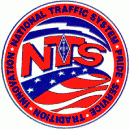National Traffic System™ (NTS™)
 During disasters or other emergencies, radiograms are used to communicate information critical to saving lives or property, or to inquire about the health or welfare of a disaster victim.
During disasters or other emergencies, radiograms are used to communicate information critical to saving lives or property, or to inquire about the health or welfare of a disaster victim.
To get involved with NTS™ , find your local NTS affiliate on the air: ARRL Net Directory Search.
Modernization of NTS (The NTS 2.0 Project)
The current National Traffic System is comprised of dedicated operators well trained and practiced in the art of traffic handling. They participate in nets at the local, section, region, and area levels 365 days per year.
Yet we cannot ignore reality: the proliferation of low-cost/free telephone calls, text messaging, and the worldwide web means today's general public has many alternatives to traditional radiograms. As a result, much of today's NTS traffic consists solely of amateur-to-amateur: "welcome to amateur radio," "license expiration" etc. In addition, there are serious questions as to the accuracy and reliability of our networks. Finally, it should be noted that some public agencies have never heard of NTS; or, have begun creating their own backup messaging systems.
For more information regarding the modernization of NTS visit The NTS 2.0 Project webpage.
Sign up to receive The NTS™ Letter
The NTS Letter is published monthly and is free of charge to ARRL members. Members can subscribe at www.arrl.org/opt-in-out.
-
NTS PowerPoint
Check out this PowerPoint on the National Traffic System (NTS) including an intro. to National Traffic System Digital (NTSD). Go Now
-
NTS Manual
Read more about the purpose, policies, and procedures of the NTS. Go Now
-
Net Directory
See how public-service nets that support the NTS™ have been registered with the directory database. Go Now
-
NTS ™ Forms
Forms related to traffic handling and the National Traffic System™: ARRL Radiogram, FSD-3, FSD-89, FSD-125, & FSD-218. Go Now
-
NTS Digital
Visit this website about the National Traffic System Digital (NTSD). Go Now
-
Instructors Guide
This guide is written for the volunteers who are willing to train Amateur Radio operators about traffic handling. Go Now
-
Net Operations
This PowerPoint Presentation explains amateur radio net operations Go Now
-
Third Party Traffic
Find out which countries share a third party traffic agreement with the United States with the Third Party Traffic List.






